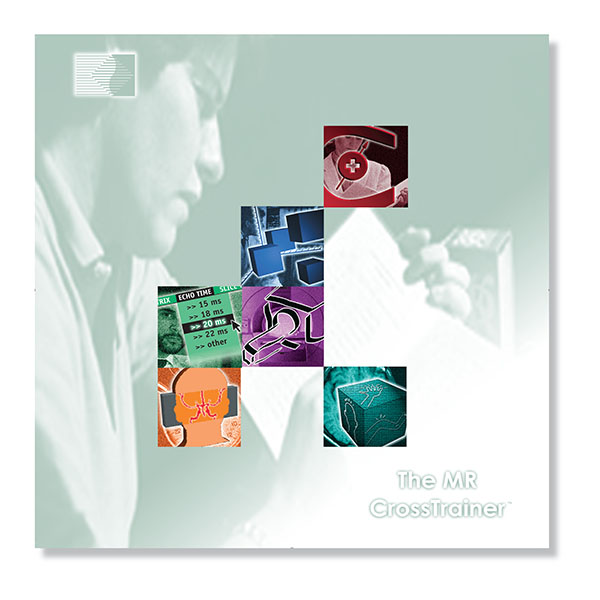
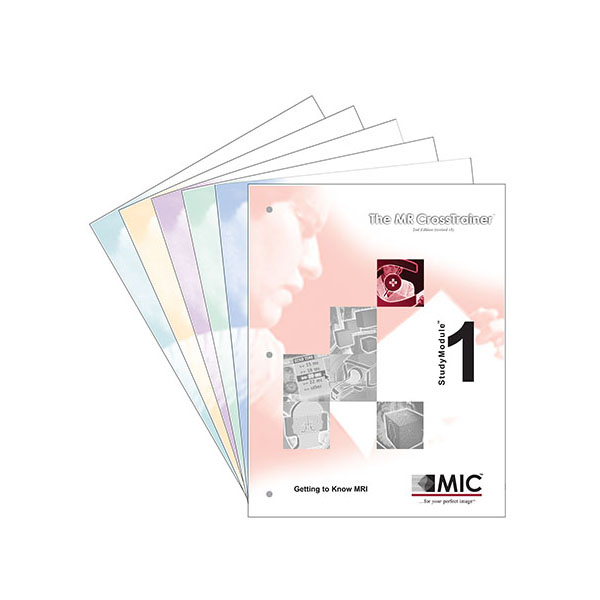
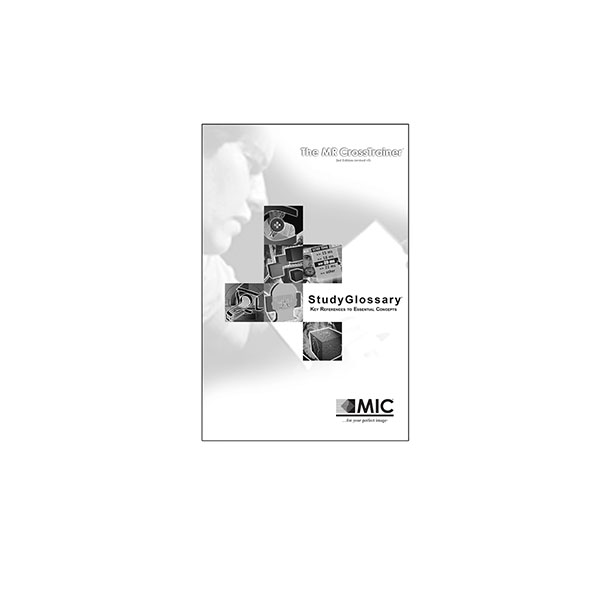
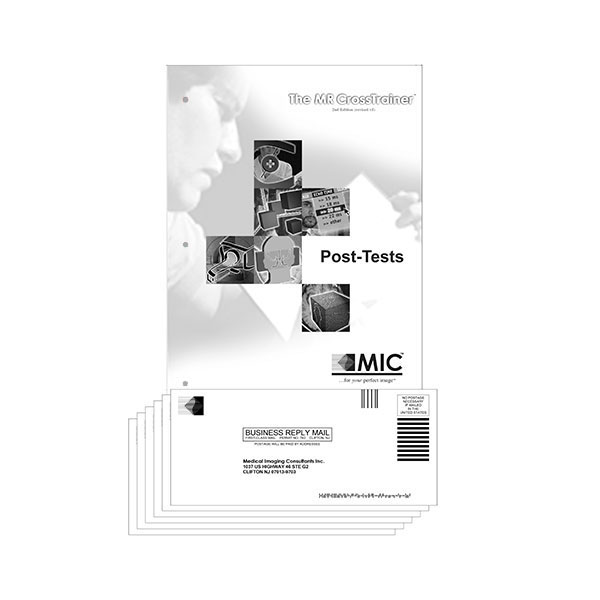
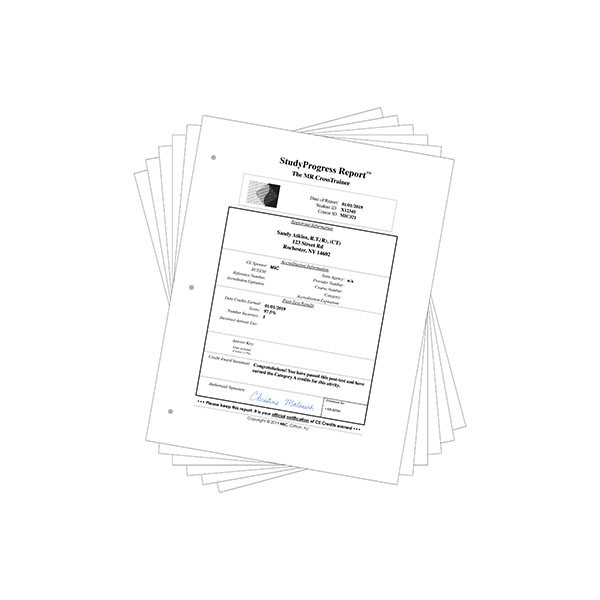
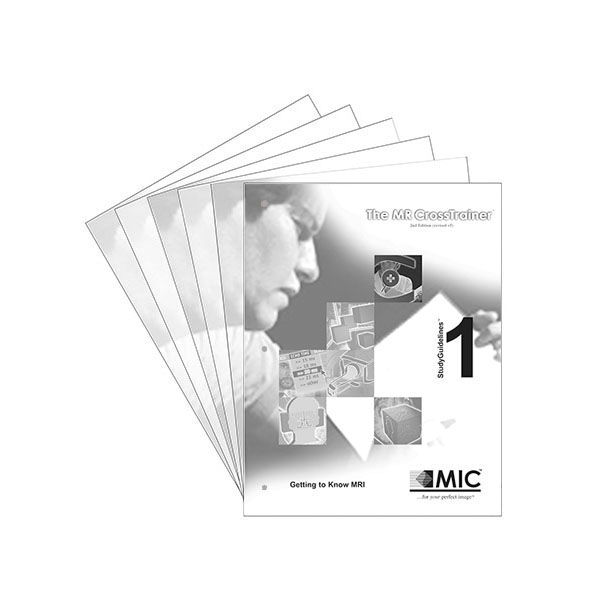
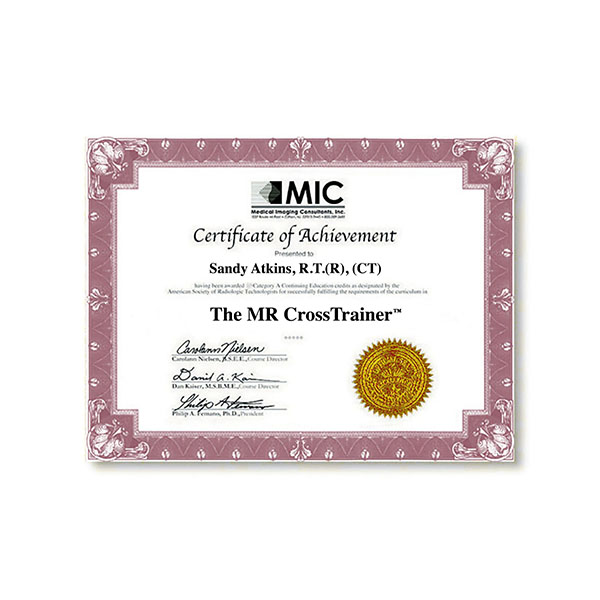

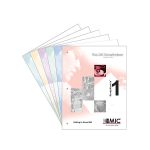
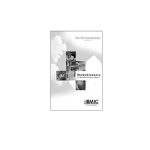
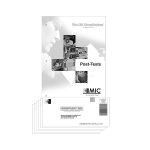
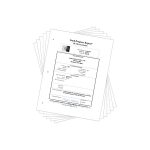
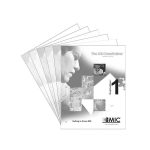
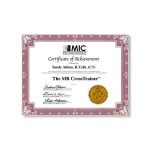
MR CrossTrainer
The MR CrossTrainer presents all of the essential physical principles, unique jargon and clinical imaging strategies of MRI. The course is intended for technologists seeking a way to develop a strong practical background in clinical MR imaging, and can serve as a valuable companion to hands-on training.
18.75 |
Technologists with little to no prior MR experience |
Try the MR CrossTrainer for 30 days! |
$199.00
- StudyModules
- StudyGlossary
- Post-Tests
- StudyProgress Reports
- StudyGuidelines
- Certificate of Achievement
- Targeted CE
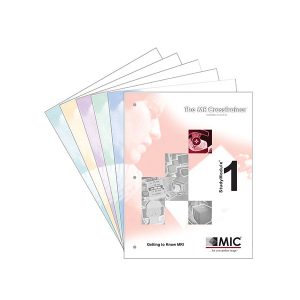
The MR CrossTrainer self-study course consists of 6 comprehensive StudyModules that are delivered to you all at once in a handy reference binder. Each StudyModule contains easy-to-follow text with an abundance of illustrations, clinical images and summaries, written in the language of the radiologic technologist.
- Getting to Know MRI
- History of Radiology Leading to MRI
- The First MR Image
- Advantages of MRI
- Inside the Atom
- Hydrogen and MRI
- Electricity and Magnetism
- Lining the Protons Up
- Precession
- RF Energy
- T1 Relaxation
- T2 Relaxation
- Generating the Signal
- The MR Pulse Sequence
- Forming MR Images
- Digital Cross-Sectional Images
- The Three Fundamental Imaging Planes
- Digital Imaging
- The Gray Scale
- The Patient Coordinate System
- Magnetic Field Gradients
- Revisiting Resonance
- How Gradients Affect the Precessional Frequency
- Slice Selection
- Slice Orientation
- Slice Thickness
- Multi-Slice Selection
- Spatial Localization Within the Slice
- Frequency and Phase
- Orienting Frequency and Phase
- Reconstructing the Image
- MR Image Appearance
- T1, T2 and Tissue Representation
- Contrast
- Resolution
- Signal-to-Noise Ratio
- Scan Time
- Repetition Time
- Echo Time
- Number of Signal Averages
- Slice Thickness
- Slice Gap
- Field-of-View
- Matrix
- Rectangular Field-of-View
- Parallel Imaging
- Reconstructing the MR Image
- Windowing the MR Image
- Introduction to Artifacts
- Wraparound
- Partial Volume Artifact
- Motion Artifact
- Metal Artifact
- MRI Hardware and System Operation
- The Flow of Data Through an MR System
- The Operator’s Console
- The Host Computer
- The Pulse Sequence Controller
- The Digital-to-Analog Convertors
- The Gradient Power Amplifier
- The RF Power Amplifier
- RF Shielding
- Magnet Types
- Magnetic Shielding
- The Gradient Coils
- The RF Coils
- The Receiver Amplifier and the ADC
- The Array Processor
- PACS System
- Advanced Imaging Techniques
- Review of Spin Echo
- Dual Contrast Spin Echo
- Inversion Recovery
- Fat Suppression and CSF Suppression
- Fast Spin Echo
- Gradient Echo
- Fast Gradient Echo
- Echo Planar Imaging
- 3D Acquisition
- Diffusion-Weighted Imaging
- Perfusion Imaging
- Introduction to MR Angiography
- MRA Post-Processing
- Time-of-Flight MRA
- Phase Contrast MRA
- Contrast Enhanced MRA
- MR Spectroscopy
- Clinical Concerns with MRI
- Use of Contrast Agents in MRI
- MRI Safety
- RF Concerns
- Magnetic Field Concerns
- Screening
- Emergency Procedures
- Legal and Ethical Concerns
- Infection Control
- The Patient Experience
- Typical MRI Exams
- Head, Spine, Joints, Thorax, Abdomen, Pelvis
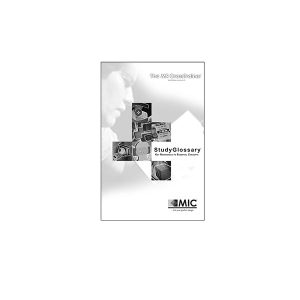
Also included with the program is a pocket StudyGlossary. The StudyGlossary contains indexed references to all key terms in the program which include definitions as well as where to look in the StudyModules to find more information about each entry.
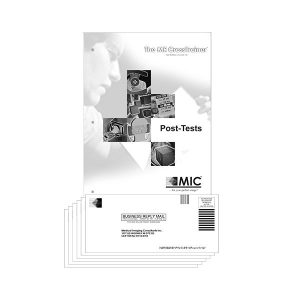
After you complete each StudyModule, there is a multiple choice Post-Test. Simply fill in the Post-Test Answer Sheet and return it to us using one of the following options:
- Use the postage-paid return envelope
- Fax your Answer Sheet for faster feedback
- Email it to CE@micinfo.com for the quickest results
Of course, all program information and Post-Test results are treated with the utmost confidentiality.
Each StudyModule has been separately accredited so you earn Category A credits as you pass each Post-Test, up to 18.75 with the MR CrossTrainer!
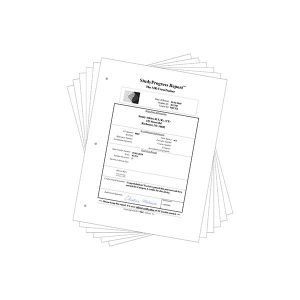
After we grade each Post-Test, we send you a StudyProgress Report that includes your Post-Test score and the official notification of the Category A CE credits earned for that Post-Test.
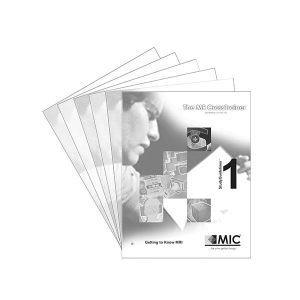
As you complete each Post-Test, you also receive a set of StudyGuidelines which presents detailed explanations of each and every Post-Test question! StudyGuidelines offer additional information not found in the StudyModules and provide you with guidance back to the specific section that you need to study further.
An Answer Key is provided once you achieve a score of at least 75%. If you score below 75%, an additional Answer Sheet is provided, and you are offered another chance at the Post-Test after you study the material further. StudyProgress Reports and StudyGuidelines are sent to you via first class mail, normally within two business days after we receive your Post-Test answers.
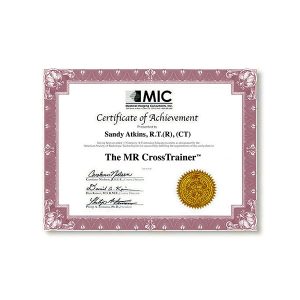
You are awarded the final Certificate of Achievement after you earn the Continuing Education credits for all the StudyModules.
The MR CrossTrainer fulfills ARRT’s entire 16 credit Structured Education Requirement for the Discipline of Magnetic Resonance Imaging.
Targeted CE per ARRT’s Discipline, Category, and Subcategory classification for enrollments starting after March 26, 2024:
[Note: Discipline-specific Targeted CE credits may be less than the total Category A credits approved for this course.]
StudyModule 1 [2.75 credits]:
- Magnetic Resonance Imaging: 2.25
Image Production: 2.25
Physical Principles of Image Formation: 1.75
Data Acquisition, Processing, and Storage: 0.50
StudyModule 2 [2.5 credits]:
- Magnetic Resonance Imaging: 2.50
Image Production: 2.50
Physical Principles of Image Formation: 2.50
StudyModule 3 [3.5 credits]:
- Magnetic Resonance Imaging: 3.50
Image Production: 2.75
Physical Principles of Image Formation: 1.25
Sequence Parameters and Options: 1.50
Procedures: 0.75
Neurological: 0.25
Body: 0.25
Musculoskeletal: 0.25
StudyModule 4 [3 credits]:
- Magnetic Resonance Imaging: 3.00
Safety: 0.50
MRI Screening and Safety: 0.50
Image Production: 2.50
Physical Principles of Image Formation: 2.50
StudyModule 5 [2.75 credits]:
- Magnetic Resonance Imaging: 2.75
Image Production: 2.00
Sequence Parameters and Options: 0.50
Data Acquisition, Processing, and Storage: 1.50
Procedures: 0.75
Neurological: 0.25
Body: 0.25
Musculoskeletal: 0.25
StudyModule 6 [4.25 credits]:
- Magnetic Resonance Imaging: 4.25
Patient Care: 1.25
Patient Interactions and Management: 1.25
Safety: 0.75
MRI Screening and Safety: 0.75
Procedures: 2.25
Neurological: 0.75
Body: 0.75
Musculoskeletal: 0.75
